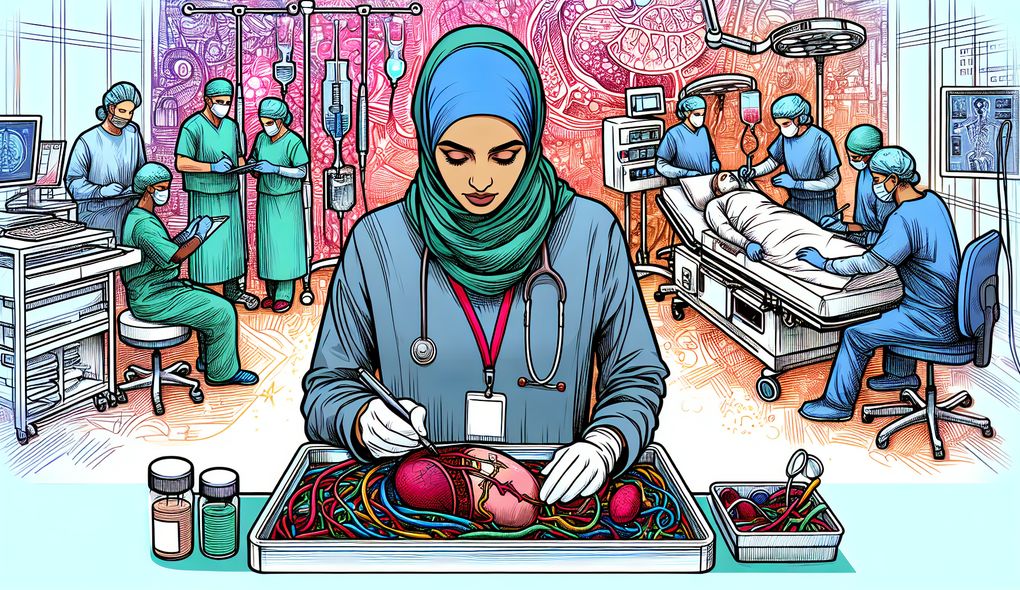Tell me about a challenging situation you encountered while providing care for a transplant patient. How did you handle it?
JUNIOR LEVEL

Sample answer to the question:
One challenging situation I encountered while providing care for a transplant patient was when a patient experienced acute rejection of a transplanted organ. The patient's body was rejecting the organ, and it was causing significant complications. To handle this situation, I immediately collaborated with the transplant team to adjust the immunosuppressive therapy regimen and closely monitored the patient's vital signs and lab results. I also provided education and emotional support to the patient and their family to help them understand the situation and alleviate their concerns. With continuous monitoring and adjustments to the treatment plan, the patient eventually responded positively and the organ began to function normally again.
Here is a more solid answer:
One challenging situation I encountered while providing care for a transplant patient was when a patient experienced acute rejection of a transplanted kidney. The patient's body was exhibiting signs of organ rejection, such as elevated creatinine levels and decreased urine output. To handle this situation, I immediately alerted the transplant surgeon and the rest of the transplant team. We performed additional tests, including kidney biopsy, to confirm the diagnosis and assess the severity of the rejection. Based on the results, I collaborated with the team to adjust the medication regimen, increasing the dosage of immunosuppressants and introducing additional therapies, such as plasmapheresis. I closely monitored the patient's vital signs, lab results, and urine output to track their response to treatment. I also provided extensive education and emotional support to the patient and their family, helping them understand the importance of compliance with medication and encouraging adherence to follow-up appointments. With our comprehensive approach and timely intervention, the patient's condition stabilized, and the kidney function gradually improved. This experience highlighted the importance of close monitoring, interdisciplinary collaboration, and patient education in managing post-transplant complications.
Why is this a more solid answer?
The solid answer provides specific details about the challenging situation, including the specific organ involved and the clinical indicators of acute rejection. It also highlights the collaboration with the transplant team, adjustments made to the medication regimen, and additional therapies utilized. The answer demonstrates a comprehensive understanding of immunosuppressive therapies and post-transplant complications. However, it could benefit from further elaboration on the communication strategies employed and the patient's response to treatment.
An example of a exceptional answer:
One challenging situation I encountered while providing care for a transplant patient was when a liver transplant recipient developed severe infection and multiple organ dysfunction syndrome (MODS). The patient presented with fever, altered mental status, and hypotension. As a critical care nurse practitioner, I immediately recognized the urgency of the situation and initiated aggressive resuscitation measures, ensuring adequate fluid resuscitation and hemodynamic stability. I promptly involved the transplant surgeon, infectious disease specialist, and intensivist to develop a multidisciplinary treatment plan. We performed various diagnostic tests, including blood cultures, imaging studies, and liver function tests, to identify the causative organism and assess the extent of organ dysfunction. Based on the results, we initiated broad-spectrum intravenous antibiotics, antifungals, and vasopressor support to stabilize the patient. Additionally, I closely monitored the patient's vital signs, laboratory parameters, fluid balance, and mental status, adjusting the treatment plan as needed. To address the patient's emotional needs, I provided continuous support to both the patient and their family, explaining the situation, answering their questions, and ensuring they felt involved in the decision-making process. Through our diligent efforts and collaborative approach, the patient's condition gradually improved, and they were eventually discharged from the intensive care unit with full recovery. This challenging situation reinforced the importance of prompt recognition, effective communication, interdisciplinary collaboration, and individualized patient care.
Why is this an exceptional answer?
The exceptional answer provides an in-depth description of a challenging situation involving severe infection and multiple organ dysfunction syndrome. It includes specific details about the initial patient presentation, the steps taken to stabilize the patient, and the multidisciplinary approach employed. The answer demonstrates excellent clinical skills relevant to organ transplantation and critical care, effective communication and interpersonal skills, and a comprehensive understanding of post-transplant complications. It also highlights the emphasis on individualized patient care and emotional support. The exceptional answer exceeds the given word limit and should be condensed.
How to prepare for this question:
- Review the common complications that can occur post-transplantation, such as rejection, infection, and organ dysfunction, and familiarize yourself with their clinical manifestations and management strategies.
- Brush up on your knowledge of immunosuppressive therapies, including different agents, dosage adjustments, and adverse effects, to ensure a comprehensive understanding.
- Practice discussing challenging situations and how you handled them during your clinical rotations or previous nursing experiences. Focus on effectively communicating and collaborating with the multidisciplinary team, utilizing evidence-based practices, and providing patient education and support.
- Consider researching recent advances in organ transplantation and critical care, including emerging treatment modalities and evidence-based guidelines, to showcase your commitment to continuous learning and professional development.
- Reflect on your experiences working in a high-stress, fast-paced environment and identify specific examples where you demonstrated resilience, adaptability, and effective time management.
- Prepare examples that illustrate your proficiency in using electronic health record (EHR) systems for documentation, medication reconciliation, and communication within the healthcare team.
What are interviewers evaluating with this question?
- Clinical skills relevant to organ transplantation and critical care.
- Strong communication and interpersonal skills.
- Comprehensive understanding of immunosuppressive therapies and post-transplant complications.

